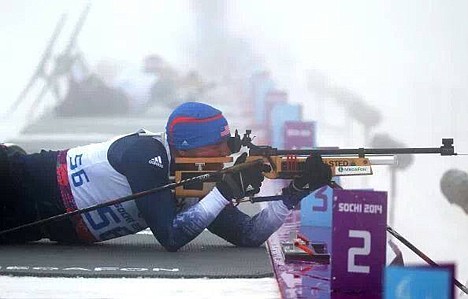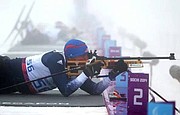Skiing in Sochi
RATHDRUM - After Sean Halsted arrived in Russia to compete in the recent Sochi 2014 Paralympics, he was amazed at the attention the winter games received.
"It was interesting to see how much they wanted to welcome us there," said the 43-year-old Rathdrum pilot, who was paralyzed in 1998 as a result of falling out of a helicopter during an Air Force training exercise.
"It wasn't like everything closed down after the Olympics. They spent as much energy on the Paralympics as they did on the Olympics."
When Halsted returned home last week after competing in three biathlon and three cross-country skiing races, he had another surprise. He heard from friends who watched him compete on NBC and NBCSN. Halsted said past competitions involving paralyzed athletes have received little to no national media coverage.
"It's nice to have people understand what you're saying (about the games)," he said. "Most of the time I've had to explain things by piecemeal footage at best."
Such attention to the Paralympics as a whole, Halsted said, was as rewarding as his finishes.
His best finish was ninth in the 15-kilometer cross-country skiing race. He finished in 44 minutes, 57 seconds; the winner in 40:51.
Halsted finished in the middle of the pack in all of the races. Each race had an average of 25 contestants.
"I wasn't happy with the results, but I am happy with the effort I put in," he said. "I can make up excuses such as how the rest of the world has become more competitive, but I'd like to see the effort I put in to be in the top five or six."
Halsted's best finish in the Paralympics in Vancouver in 2010 was sixth in the 10-kilometer cross country skiing race.
Halsted said he hopes to compete in the games in South Korea in 2018.
"It looks like I'll be able to continue on," he said, adding that his three children are getting busier with activities. "But, if I don't make it, others can use me as an example to go further instead of starting at ground zero."
Halsted has always been a competitor. In high school at Mead in Spokane, he participated in soccer and on the cross-country team. He was on the rowing team at Washington State University.
After suffering the spine injury in the Air Force, he has gradually learned new ways to compete.
He trains an average of two hours a day and also enjoys sled hockey, handcycling, swimming and downhill skiing. He volunteers with the Paralyzed Veterans of America, advocating for accessibility.
"I love helping people get back into sports," he said. "Sports pushes you and takes away a lot of your excuses."
Halsted said he has had a lot of challenges in the past 16 years, but it's the "general climbs up" that keep him motivated.
"I've gone from learning how to tie my shoes to focusing on being faster than the Germans," he said. "I've found myself in places that I wouldn't have been if I had never pushed myself."



